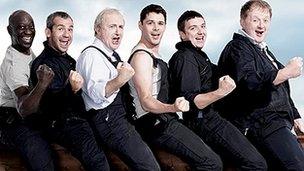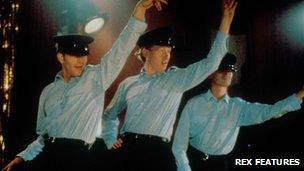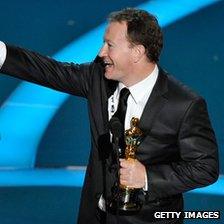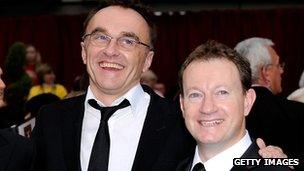Stars go the Full Monty on stage in Sheffield
- Published

The cast of the new stage show are appearing in Sheffield before a UK tour and then the West End
The Full Monty, the 1997 film about Sheffield steelworkers-turned-strippers, was one of the most successful British movies of all time. Now its Oscar-winning writer Simon Beaufoy has transformed it into a play in the city.
The final frame of the Full Monty film showed 12 bare buttocks and a crowd of whooping women.
Then the screen faded to black and the credits rolled.
The aforementioned cheeks belonged to six actors playing unemployed men who had been chucked on the scrap heap of life when their factory shut.
Penniless and desperate, and in defiance of various natural obstacles (there was the fat one, the scrawny one, the old one etc), they decided to boost their bank balances and self-esteem by staging a male strip show.
The story was heart-warming and funny, and while it also tapped into a streak of existential anxiety about the erosion of men's traditional roles in the workplace and the home, it was basically building up to that bottom-baring finale.
The film-makers were able to shoot the climax, where the six guys whipped off their posing pouches, in a relatively tasteful way.

The Full Monty film starred (left-right) Hugo Speer, Steve Huison and Robert Carlyle
But in a theatre, its a different story. For the six actors on stage, there is nowhere to hide. The play retains the same humour and pathos and angst as the film. But the real question is - do the actors go the full monty?
"They certainly do," says writer Simon Beaufoy. "With complete abandon, I may add, having seen the rehearsals. Quite shocking in a small room with fluorescent lights."
On stage, the lighting will be arranged more sensitively to spare at least some of the actors' blushes. But Beaufoy continues: "There's no hiding place for those actors - they are absolutely up for it and they certainly go the full monty. There's no dodging it."
Although the front row will get an eyeful, Beaufoy reminds us that there is more to The Full Monty than the full monty. "It's about people, not about strippers," he points out firmly.
Sixteen years after the film became an unlikely hit, making $250m (£160m) at box offices around the world, the story of desperate times calling for desperate measures still strikes a chord today, Beaufoy believes.
"It is the perfect time to do it," he says of the stage version. "We're right back in another recession."
He decided against updating the action to the present day because the current economic crisis is "less visible" than when heavy industry was wiped out in northern England in the 1980s and '90s.
"This is really insidious," Beaufoy says. "Everyone's in their bedrooms clicking on a computer trying to find a job. There aren't big dole queues. It's a much more lonely recession in a funny kind of way, this one, and a more creepy one. If you don't look hard, you don't see.
"Whereas that, I remember cities like Sheffield looking like the Blitz. There were craters where there used to be factories and steelworks. The place was decimated very visibly. So we've kept it in that particular recession, although of course the echoes are as clear as a bell."
The actors taking to the stage for the new show, which is currently at the Sheffield Lyceum before going on a UK tour and then to the West End, include ex-Coronation Street star Craig Gazey, Kieran O'Brien (Cracker, Gruey) and Simon Rouse (The Bill's Jack Meadows).

Simon Beaufoy won an Oscar for Slumdog Millionaire in 2009
Beaufoy was keen to do his own stage version after a US production relocated the action to Buffalo, New York. That opened on Broadway in 2000, earning 10 Tony Award nominations, before transferring to the West End two years later.
Beaufoy did not see it. "I felt really disappointed that they didn't set it in Sheffield," he says. "I didn't understand why they wouldn't set it in Sheffield. I guess it was to make money. To turn the play into something set in America felt completely wrong."
The original film was Beaufoy's first feature and earned him an Oscar nomination. "I didn't make a penny out of The Full Monty," the Yorkshire-born writer reveals.
"I got paid for a draft but I didn't make any profit. A lot of people did and I didn't. That's just the way it went. But that was probably good for me because the day after the Oscars, I was back at my desk writing. I just had to keep working and working. I learned my trade."
Rejecting Hollywood's advances after The Full Monty's success (he turned down "Conan the Barbarian sequels and things"), Beaufoy opted to hone his craft on Brit flicks like Among Giants and Blow Dry.
He has since won an Oscar for Slumdog Millionaire and wrote the scripts for 127 Hours, Salmon Fishing in the Yemen and the forthcoming Hunger Games sequel Catching Fire.

Beaufoy (right) worked with director Danny Boyle on Slumdog Millionaire and 127 Hours
The new version of The Full Monty is his first theatre venture. Getting to grips with the differences between stage and screen was "terrifying", he says.
"I remember handing the first draft of what I thought was the play to the producer, David Pugh, who said, 'Well done love, that's lovely, marvellous, brilliant. Can you put two days aside so I can teach you how to write a play?'
"Until I started writing, I didn't really understand what was particularly special about theatre compared to film.
"Theatre likes ideas and to examine ideas. Film doesn't really. Film's about emotion. It doesn't like contemplating ideology or politics or thoughts very much. Theatre does. It's got time for all that."
By the end of the play, once the human stories have been told, the writer is hoping that the theatre audience will be as excited about the strip-tease finale as the wild crowd in the movie.
I raise the prospect that the theatre patrons may be more reserved than the mob of excitable ladies who scream for the fellas to get their kit off on screen.
He is confident that the crowd will be "desperate for it to happen, for the people on stage to be successful" - in their lives as well as their routine.
"I'm hoping they'll be baying for blood at about that point," he says. "But if they're sitting there politely, then we've blown it."
- Published11 May 2012
- Published23 September 2011